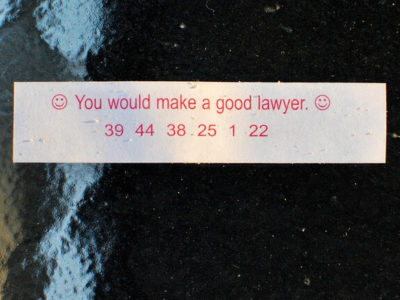While writing a post-interview thank you note by hand may seem old-fashioned, it can be a unique way to set yourself apart from other applicants. An interviewer with a full inbox of thank you emails from numerous candidates appreciates when the occasional piece of snail mail makes it to their desk. In a world where most people say thank you digitally, the extra time and effort of a handwritten note can really help you stand out.
Follow these 10 steps to getting an interviewer’s attention with a personalized, handwritten thank you note.
Step 1: Take Notes

The process of writing a memorable handwritten thank you note starts during the interview. If you take thoughtful notes, the thank you note will write itself later on. Jot down any detail the interviewer shares with you about the position, the company or themselves. Not only does taking notes help you remember the specifics of the job, but it also allows you to incorporate details into your thank you note and show that you were listening carefully.
Step 2: Get to Know the Interviewer

In the interview, ask questions. Ask not only about the job, but also about the interviewer. You might consider asking them why they chose to work at the company or what they enjoy about working there. “When the interviewer is responding to those questions, they’re often letting you in on some insights to who they are as a person and what their values are,” said Angelina Darrisaw, founder and CEO of C-Suite Coach. Having a sense of what matters to the interviewer helps you write a thank you note that feels personal. If the interview takes place in person, you can look around their office to get a feel for their interests and experiences. If the interview takes place virtually, Google the interviewer and take a look at their LinkedIn profile. Find and remember important, specific details about them.
Step 3: Send an Email

Even if you plan to send a handwritten thank you note, a follow-up email should always come first. Since a handwritten note takes longer to get to your recipient’s desk, sending an email ensures your thank you message arrives before the hiring manager makes their decision. “[Sending a handwritten thank you note] needs to be in addition to an email because you still want to have a response time within 24 hours after having the interview,” said Beth Hendler-Grunt, president of Next Great Step. An email also provides more room to ask questions and include insights you forgot to mention in the interview, while a handwritten note should be brief and concise. Think of the follow-up email as your main message. The thank you note then serves as a reiteration of the same message.
Step 4: Check the Salutation

Imagine this: The interviewer receives your thank you note, opens it up and the first thing they see is their name, misspelled. Or worse, the name of a different interviewer from a different company. When you sit down to draft a thank you note, make sure you have the correct name and the correct spelling. Mix-ups happen, especially in the middle of applying for several jobs at once. But you can catch these mistakes by looking over your note several times before sending it off. You should also always start the letter with “Dear [Insert Interviewer’s Name]” and never with “To Whom It May Concern.” An impersonal salutation or a misspelled name can lead to a missed opportunity, no matter your level of talent or qualifications.
Step 5: Say Thank You

Here’s the step that matters most. After all, the whole point of a thank you note is to say thank you. Let the interviewer know how much you appreciate their time and consideration. Show gratitude for insights they shared with you about the position. “A thank you note is sent because interviewees want to thank the representative for taking the time to explain who and what the company looks for when hiring,” said Michael Laughter, Education Outreach and Communications Manager at Georgia Institute of Technology. Sending a thank you note in the first place can help you stand out since not every applicant remembers to do so. But you’ll make even more of an impression if your note demonstrates genuine thankfulness.
Step 6: Sell Your Skills

Remember, interviewers communicate with a large pool of other applicants every day. A handwritten note already helps you stand out on its own, but you can also mention your skills to remind the interviewer who you are. Providing specific details about yourself and how you can contribute to their goals can help jog their memory and demonstrate how you differ from other candidates. “You can send something very general, but this is your chance to also remind them why you are the right candidate. It’s another chance for you to be memorable,” Hendler-Grunt said. While selling yourself helps you stand out, a handwritten note shouldn’t exceed 3 or 4 sentences. Avoid attempting to summarize your entire resume in just a few words. “[The thank you note] is not a time for candidates to be rehashing why they’re qualified. It should really focus more on gratitude and a reflection of what happened in the actual interview,” said Dana Hagenbuch, founder of Dana Hagenbuch Search. At the end of the day, the main message of the handwritten thank you note should take priority, so don’t spend too much time writing about yourself.
Step 7: Remember the Details

Now comes the fun part: tugging the interviewer’s heartstrings. Because handwritten notes take time, effort and human touch, they should feel more personal than an email. The details you observed while you were in your interview mean everything when it comes to personalizing your note. “It is valuable to have that personal touch, especially when you can bring in something special that someone said to you in the interview,” Darrisaw said. Did the interviewer discuss a specific goal of the company? Maybe you can find an article that relates to that goal and mention it in your note. Did the interviewer talk about a book they read that inspired them? You can order a copy and mention it in your note. Does the interviewer love dogs? Get your hands on a thank you card with a dog on it. By personalizing your note, you show that you listened during the interview and that it meant something to you.
Step 8: Be Yourself

Remember, if you can find a thank you note template online, so can every other candidate. When you write your note, steer clear of templates from the web. Write based on your own thoughts and notes and nothing else. “Be yourself. It sounds simple, but students spend so much time writing for a grade or otherwise trying to please a teacher that they forget how to be themselves,” said Jack Schacht, founder of My College Planning Team. Employers can tell the difference between a note that came from the heart and a note that came from someone else’s words. You can’t go wrong with genuineness.
Step 9: Proofread

You can’t use spell check on a handwritten note, so start by typing out your first draft. After you run it through spell check, review it again for clarity and conciseness. Even though a handwritten note has a personal feel, you should still stick to a formal tone. Rephrase any negative statements and put them in a positive light. “Be thoughtful about your language. You don’t want to say things like ‘I forgot,’ ‘I failed to mention’ or ‘I don’t know enough about that’ or anything that sounds negative,” Darrisaw said. Once you’ve finished proofreading your letter on your own, ask someone else to read over it for you. The process of editing and revising a thank you note can be time-consuming, but thorough proofreading keeps unfortunate and awkward mistakes — like typos and misspelled names — from interfering with your chances of getting the job.
Step 10: Send It!

Drop your note in the mail as soon as possible. Ideally, you want the interviewer to read it before they make their choice, especially if it’s between you and just a few other candidates. If you all have the same level of skills and experience, a thoughtful thank you note can help the hiring manager make that final decision. “When it’s getting down to the wire and you’re equal, there’s going to have to be something that sets you apart. This is one of the many things you need to do to set you apart,” said Diane Gottsman, national etiquette expert, author and founder of the Protocol School of Texas. If your note doesn’t arrive on time, you could miss out on that opportunity. Start drafting your note as soon as possible after the interview so you can get it in the mail right away.




















